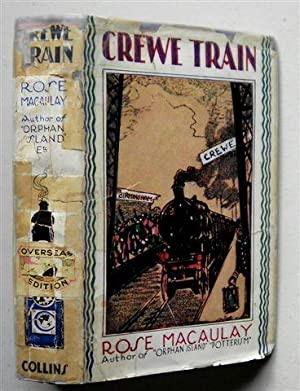
Book review by Frances S:
‘We have some very bright evenings. There’s a nice reading circle, too.’
‘A what?’ Denham was apprehensive.
‘A reading circle. You all study some book together, and meet and talk about it’
‘What for?’
‘What funny questions you do ask, to be sure.’
Crewe Train (apparently a reference to the 19th century music hall song ‘Oh Mr Porter’) opens with a ‘preliminary’ introducing us to Mr Dobie, a bored, hypocritical, Anglican clergyman. Dobie’s wife has died, leaving him with their seven-year-old daughter, Denham (‘named after her mother’s favorite Buckinghamshire village’) and enough money to live on. Dobie resigns his job and decamps with Denham, ‘a very self-sufficing and independent child’, to a quiet village in Mallorca. They resent the warm welcome of the locals, and when, after a few years, friendly English visitors begin to arrive, the pair move to a lonely farmhouse on a bleak hillside in Andorra. Mr Dobie falls for ‘the handsome daughter of a prosperous local smuggler’, marries her and has four more children. He despises himself for this, is churlish to his wife and new family, and brings up Denham to be equally lazy and rude.
When Denham is twenty-one, her maternal Aunt, Evelyn Gresham, and four cousins come to visit. Mr Dobie has a stroke and dies in the night. The Greshams dutifully take Denham back to London with them. They are kind and well meaning, but mistakenly assume that Denham will enjoy their round of social engagements. Denham cannot understand why anyone would want to socialise, but she tries to fit in.
The Greshams are not vapid. Evelyn cannot imagine Denham ‘learning to be a doctor, or a lawyer, or a teacher, or a secretary, or any of the usual jobs’, but this suggests that these are real career options for girls in the Gresham family. Indeed, one cousin is already working in her father’s successful publishing company, and another is studying at Oxford. Most members of the family are authors, or aspiring authors.
Denham dislikes writing and has no interest in fiction. She cannot make conversation, but given the chance would talk obsessively about maps, guide books, meteorology, animals and making things. Sadly, no one encourages her enthusiasms. Denham takes other people’s comments literally, and has no ‘sense of humour’. She would probably today be diagnosed as autistic.
The Greshams simply find her rude. However, Arnold, a junior partner in the Gresham publishing house, is attracted to Denham. They fall passionately in love and Denham, reluctantly compliant as ever, accepts Arnold’s proposal of marriage.
Denham spends the summer with her late father’s sister in Torquay. Yet again, Denham finds herself the odd one out in a family who ‘chattered away, saw people, consumed meals in the houses of others, gave others to eat and drink in their house, like the rest of the world.’ Mr Bartlett is a dentist; the family,’ who say ‘pardon me’ and ‘granted’’, are on a lower social level than the Greshams. Denham also visits Arnold and his parents at their second home in Fowey. Denham wants to live permanently in Cornwall, but Arnold cannot imagine leaving London.
Denham and Arnold marry, enjoying a long honeymoon in the Balearic Islands before returning to a rented flat in Tavistock Square. Denham earnestly tries to fulfill society’s expectations of a wife, uncomfortably aware that she will inevitably be what her Aunt Evelyn calls ‘the dead spot’ at a dinner table. Denham becomes pregnant but miscarries, to her relief and Arnold’s disappointment.
They spend the next summer in Cornwall. Denham finds a passageway deep in the cliffs, leading from the shore to a hidden ‘room’ and up into an empty, isolated cottage. She persuades Arnold to rent the cottage, and reveals to him its secret. He promises not to tell anyone, but mentions it to Evelyn. Evelyn reveals all via a gossip columnist, ruining Denham’s idyll by bringing gawpers to the cottage. Worse still, Evelyn drafts a romance about the couple, in which Denham’s character has an affair with a local fisherman, resulting in an illegitimate child. Evelyn begins to believe her own fabrication, spreading the story amongst her friends. Malicious rumours threaten the marriage, especially when Denham becomes pregnant again. Denham’s in-laws take control, and she is forced to choose between the ‘taming emotion’ of love for her husband and her desire for an unfettered life.
Seeing the metropolitan 1920s through the eyes of a young woman bemused by its foibles is a smart device. Witty epigrams abound, including jibes at social and literary pretension, casual racism, the Church and politicians, such as the Liberal MP ‘who was weighted with the cares of not being in office.’
On the surface, then, a comedy of manners, but there is nothing funny about Denham’s lack of fulfilment or Evelyn’s appalling habit of creating scandalous gossip, and Crewe Train smacks of intellectual snobbery in its self-referential world of publishing and middle-class society.
A ‘black comedy’, then? Perhaps, but marred by inconsistencies. Denham was brought up by a taciturn father in a Catalan speaking household, community and school. Surely Denham’s clever English relatives, who pride themselves on their language skills, would have remarked on this and perhaps understood her difficulty in engaging in English dinner party conversation. Her father’s passion for a young Andorran woman is at odds with his reclusive nature, and although we are told he regretted his action, he did not regret it sufficiently to prevent him fathering four children with his new wife. Denham’s own previous sexual experience is referred to, but with no explanation of who her lover(s) may have been. Nor are we told anything about Denham’s schooling, or how and when she acquired and looks after the dog and motorbike that suddenly appear when it suits the story.
As for the title: there seems little connection between Denham’s story and a risqué song about a flighty London girl ready to do anything to get back to the big city.
